The 263, 395 and 527 GHz DNP-NMR Spectrometers from Bruker are the worlds first commercially available solid-state dynamic nuclear polarization-enhanced NMR systems (DNP-NMR).
All DNP-NMR spectrometers enable extended solid-state NMR experiments with unmatched sensitivity for exciting new applications in material science, biomolecular research, and pharmaceuticals. The Bruker DNP spectrometers have a well-established record of performance, with over 25 systems fitted globally.
Signal improvements from 20 to a factor of 200, triggered by microwave irradiation to transfer polarization from unpaired electron spins to nuclear spins. The unique high power gyrotron systems, supplying microwaves at 263 GHz, 395 GHz, and 527 GHz are safe, strong, and easy-to-use, allowing long term DNP experiments without time restrictions.
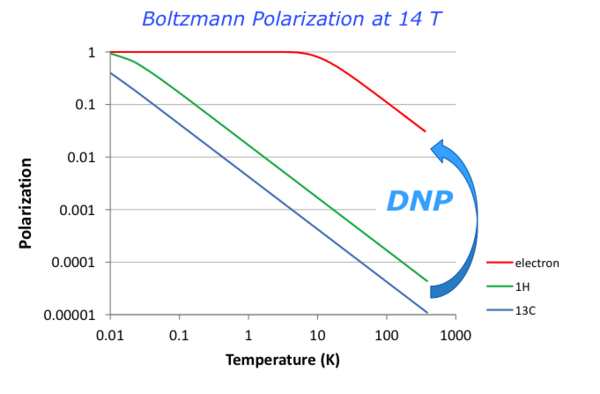
DNP samples are prepared by incorporating a polarizing agent or exploiting a native radical on the sample of interest. Experiments are conducted at a low temperature of ~100 K with continuous microwave irradiations and profit from the innovative low-temperature MAS probe that allows sample polarization in-situ, directly at the NMR field.
- Turn-key solution for DNP-enhanced solids NMR experiments at high field
- User-friendly software-controlled high power gyrotron
- Unique high power microwave sources
- Polarization enhancement yields factor up to 200 gain in sensitivity for solid-state NMR
- Low-temperature MAS probe technology with built-in waveguide and cold spinning gas supply
- AVANCE™ III HD 400, 600 and 800 wide bore NMR system with sweep coils
- Optimum beam propagation to the sample ensured by microwave transmission lines
Technical details
Gyrotron Microwave Source
The gyrotron includes a sealed tailor-made gyrotron tube, control system, and superconducting magnet, all engineered to offer reliability, high stability, and ease of operation. Beam propagation to the sample is guaranteed by superior microwave beam quality and corrugated waveguide. The sample is polarized in-situ in a low-temperature NMR MAS probe.
| 1H NMR Frequency |
WB NMR Magnet |
Gyrotron Frequency |
Gyrotron Magnet |
| 400 MHz |
400/89 Ascend DNP |
263 GHz |
4.8 T cryogen-free |
| 600 MHz |
600/89 Ascend DNP |
395 GHz |
7.2 T cryogen-free |
| 800 MHz |
800/89 USP RS |
527 GHz |
9.7 T cryogen-free |
LT MAS Probe
- Cold sample coil and RF circuit
- Low sample temperature (~100 K)
- 3.2 mm MAS rotor (17 kHz max at 100 K)
- Insert/eject of cold samples
- WB triple resonance probe (H/C/N)
- Automatic refill of liquid nitrogen supply
- Dry low-temperature nitrogen gas supply
- Three lines: bearing, drive and VT
- Long term operation (days, weeks)
- Waveguide for microwave irradiation
1.9 mm DNP MAS Probe
DNP experiments are performed at a low temperature (100 K) for excellent transfer of polarization from electron spins to nuclear spins. Until recently the spinning frequency at 100 K was restricted to 15 kHz with a 3.2 mm rotor.
With the launch of the Bruker 1.9 mm low-temperature MAS (LTMAS) probe, DNP experiments are now capable of performing up to 25 kHz MAS frequency for improved spectral resolution.
The 1.9 mm probe includes pneumatic insert/eject capability at cold and ambient temperature. The ability to change samples while the probe stays cold is critical for best use of experiment time. The probe is offered with HCN or HX NMR circuits.
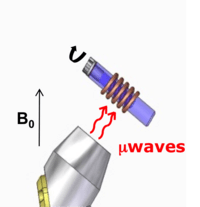
Control Systems
- Controls and regulation
- User Interface
- Voltages, temps, water cooling, gyrotron magnet
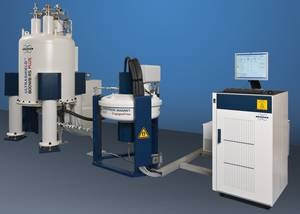
527 GHz DNP-NMR
Applications
Sample Preparation and DNP-Enhanced CPMAS of 13C-Proline
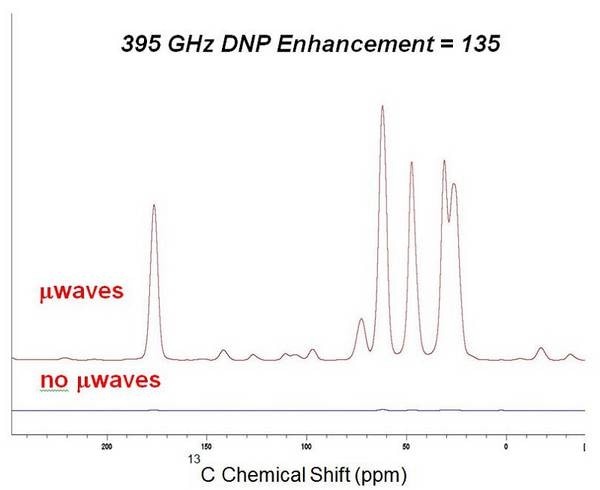
The DNP samples are prepared by incorporating a polarizing agent (such as e.g. TOTAPOL biradical) to a shared solvent or alternatively by employing a native radical on the sample of interest.
The samples are measured under MAS while at low temperatures, usually 100 – 120 K. Unmodified NMR experiments are conducted while profiting from uninterrupted DNP-enhanced signal intensity through CW microwave irradiation.
DNP-enhanced NMR in biological solids
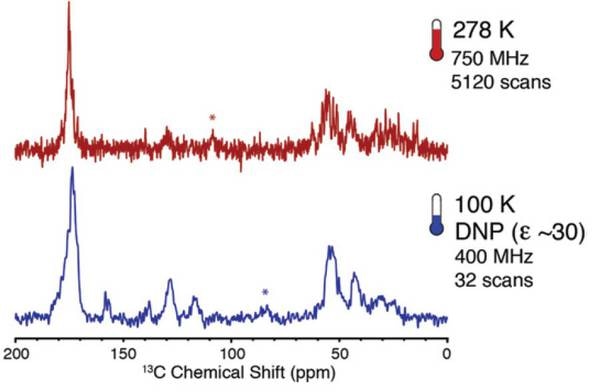
An extensive range of biological samples have been successfully improved on the Bruker DNP-NMR spectrometer including membrane proteins, soluble proteins, small peptides, and large biological complexes.
Improved sensitivity from DNP allows the characterization of expansin protein binding to plant cell walls
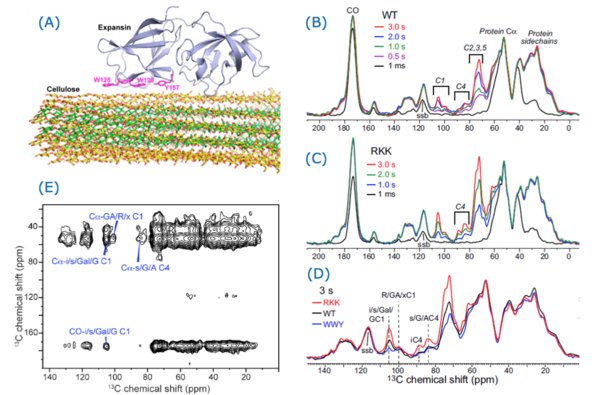
DNP experiments provide quick detection of ~1% U-13C,15N expansin mixed with plant cell walls. A REDOR filter chooses only signals from the expansin 13C signals and spin diffusion mixing following the REDOR filter exposes correlations between the cell-wall polysaccharides and expansin. Comparison of the wild-type protein with two mutants reveals that site-specific cellulose binding is correlated with robust wall-loosening activity.
Material Science
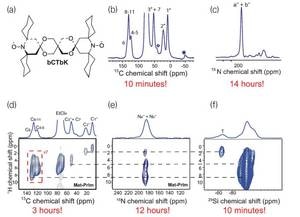
DNP NMR allows molecular level characterization of hybrid organic silica material. These materials are principal compounds for applications in drug delivery, catalysis, and separation and purification devices.